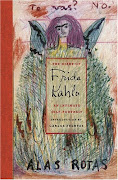 [Sylvia Plath (1932-1963):
[Sylvia Plath (1932-1963):Self-portrait (1951)]
Lecture 7:
Confession or Performance?
[Dr. Mary Paul]
Anthology texts to read:
- Ted Hughes: 'The Rabbit Catcher' & 'The Shot,' from Birthday Letters (1998)
- Sylvia Plath: from The Bell Jar (1966)
- Sylvia Plath: ‘The Rabbit Catcher,’ ‘Daddy’ & ‘Lady Lazarus,’ from Collected Poems (1981)
- Sylvia Plath: from The Journals, ed. Ted Hughes (1983)
- Sylvia Plath: from The Journals, ed. Karen V. Kukil (2001)
Tuesday March 24, 2009, 08:26 AM
Son of poet Sylvia Plath commits suicide
LONDON (Reuters) - The son of the poets Sylvia Plath and Ted Hughes has committed suicide 46 years after his mother gassed herself, his sister told a newspaper on Monday.
Nicholas Hughes, 47, hanged himself at his home in Alaska, Frieda Hughes, who is also a poet, told The Times.
"It is with profound sorrow that I must announce the death of my brother, Nicholas Hughes, who died by his own hand on Monday, March 16 ... He had been battling depression for some time," Hughes said in a statement to the newspaper.
Frieda Hughes, who was reported to be flying to Alaska, could not be reached for comment.
Nicholas Hughes, who was unmarried, had until recently been professor of fisheries and ocean sciences at the University of Alaska, Fairbanks.
Plath has been at the centre of a literary cult since she committed suicide in 1963 at the age of 30 by gassing herself in the London flat while her children, one-year-old Nicholas and two-year-old Frieda, slept.
Plath, famous for her autobiographical novel The Bell Jar and the poetry collection Ariel, left bread and milk for the children and sealed their room against the gas. They were unharmed.
Critics blamed Ted Hughes for driving the American poet Plath to despair, and their relationship has been the source of public fascination fuelled by a 2003 Hollywood movie starring Gwyneth Paltrow and Daniel Craig as the troubled couple.
Ted Hughes' lover Assia Wevill also committed suicide in 1969, at the same time killing her young daughter from the relationship with the poet.
He was one of Britain's most distinguished poets and was given the honour of being appointed poet laureate, but Plath's suicide cast a shadow over him until his death in 1998.
(Reporting by Adrian Croft; Editing by Phakamisa Ndzamela)
I guess this tragic story is as good a place as any to begin our discussion of the history (and bodycount) associated with so-called "confessionalism" in literature.
Let's begin with the word "confession" - obviously it has a religious connotations. one of the earliest autobiographies in world literature is the fourth-century The Confessions of St. Augustine, in fact. The idea was to examine the inner parts of a life, the parts hitherto accessible only to yourself, rather than the publically available facts of a life, as recorded in the Emperor Augustus's Res Gestae Divi Augusti [Deeds performed by the God Augustus].
As a literary movement, however, it really came to prominence in the mid to late twentieth century as a result of the confluence of the Beat movement (Burroughs, Corso, Ferlinghetti, Ginsberg, Kerouac et al.) on the West Coast, with the East Coast poetry establishment represented by Robert Lowell, Elizabeth Bishop, Randall Jarrell and John Berryman.
Lowell saw Snodgrass's "Heart's Needle" (which he read in 1957, long before its publication) as a crucial milestone. He also taught Sylvia Plath and Anne Sexton in some of his poetry classes at Harvard.
We can construct a very rough chronology of publications as follows:
- Allen Ginsberg:
- Howl (1956)
- Kaddish (1961)
- Jack Kerouac:
- On the Road (1957)
- William Burroughs:
- Naked Lunch (1959)
- William Snodgrass:
- Heart's Needle (1959)
- Robert Lowell:
- Life Studies (1959)
- For the Union Dead (1964)
- Notebook (1969)
- The Dolphin (1973)
- Anne Sexton [suicide - 1974]:
- To Bedlam and Partway Back (1960)
- All My Pretty Ones (1962)
- The Death Notebooks (1974)
- Al Alvarez:
- [ed.] The New Poetry (1962)
- The Savage God: A Study of Suicide (1971)
- Sylvia Plath [suicide - 1963]:
- The Bell Jar (1963)
- Ariel (1965)
- John Berryman [suicide - 1972]:
- 77 Dream Songs (1964)
- Love & Fame (1970)
- Ted Hughes:
- Crow (1970)
- Birthday Letters (1998)
As you see, a good many of these writers didn't actually commit suicide, but there was a tendency in all of them to live in an extreme, razor's edge way, and then write about the results.
Our main case-study here, though, has to be Sylvia Plath (here's a link to a very detailed biography site about her) and Ted Hughes (here's a link to a similarly detailed site about him) - perhaps the most famous poetic couple in literary history.
Sylvia achieved fame after her death, and partly as a result of it. The rest of Ted Hughes's life was dominated by the implication that he was the kind of man who drove his partners to kill themselves (especially after the 1969 suicide of Assia Wevill, the young poet he left Sylvia for in the first place).
It's not so much for us to sit smugly in judgement on these tortured, disordered lives, but more to register just how much we know about each of them - and how much we've had to find out in the course of reading their (largely posthumous) literary legacy.
Could there even be said to be a difference between their literary and actual lives at this point?
Confessionalism may have resulted in some of the most exciting and influential poetry of the twentieth century, but it's also an extremely perilous and addictive literary mode. It's impossible to ignore it altogether, though, when our larger subject is Life Writing and the use of one's life as literary material ...
•
Workshop 6:
EITHER: Family Gatherings
OR: Seven










No comments:
Post a Comment